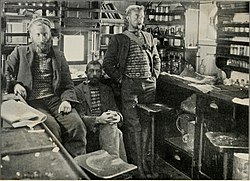Robert Rudmose-Brown
Robert Rudmose-Brown | |
|---|---|
| Born | 13 September 1879 |
| Died | 27 January 1957 Sheffield |
| Alma mater | Dulwich College |
| Occupation(s) | Professor (botany), University College, Dundee Consultant, Scottish Spitsbergen Syndicate |
| Known for | Botany, polar exploration |
Robert Neal Rudmose-Brown (13 September 1879 – 27 January 1957) was a Scottish academic botanist[1] and polar explorer.[2]
Early life

Rudmose-Brown was born on 13 September 1879, the younger son of an Arctic enthusiast, [3] and educated at Dulwich College. He studied Natural Sciences at the University of Aberdeen. In his first academic post, between 1900 and 1902, he assisted Professor Patrick Geddes with the teaching of botany at University College, Dundee, at that time part of the University of St Andrews.[4]
Antarctic exploration
At Dundee he met William Speirs Bruce who invited him to join the Scottish National Antarctic Expedition where he catalogued the wildlife of the South Orkney Islands.[5] The Rudmose Rocks, charted by the expedition in 1903, were named for Rudmose-Brown by Bruce.[6] On returning home he became Bruce’s assistant at the Scottish Oceanographical Laboratory,[7] a consultant to the Scottish Spitsbergen Syndicate and vice-president of the International Polar Congress. In 1907 he was appointed a lecturer in geography at Sheffield University and spent several seasons as a field botanist in Svalbard.
War Service
As a result of this when war came he worked at the Intelligence Department of the Naval Staff in London with responsibility for Arctic information, a role he reprised between 1939 and 1945.[8]
Academic rise
In 1920 he became reader in geography at the Manchester University and in 1931 he returned to Sheffield as professor of geography.[9]
Reputation consolidated
He was president of the Institute of British Geographers between 1937 and 1938 and at different times served as the president of the Arctic and Antarctic clubs.[10] He died in Sheffield on 27 January 1957,[11] bequeathing his polar library to the Scott Polar Research Institute in Cambridge.[12]
Bibliography
- Rudmose-Brown, R. N., The Voyage of the Scotia, Being the Record of a Voyage of Exploration in Antarctic Seas, 1906
- Rudmose-Brown, R. N., Principles of Economic Geography, 1920 (new ed. 1926, 1931, 1939, 1946)
- Rudmose-Brown, R. N., A Naturalist at the Poles: The Life, Work and Voyages of Dr. W.S. Bruce, the Polar Explorer, Seeley, Service & Co., London, 1923
- Rudmose-Brown, R. N., The Polar Regions: A Physical and Economic Geography of the Arctic and Antarctic, Methuen, 1927
- Rudmose-Brown, R. N. (1922). "Åland Islands". In Chisholm, Hugh (ed.). Encyclopædia Britannica (12th ed.). London & New York: The Encyclopædia Britannica Company.
- Rudmose-Brown, R. N. (1955). "Spitsbergen". Encyclopædia Britannica. Vol. 21. pp. 248–249.
References
- ^ Obituary of Robert Neal Rudmose Brown Transactions and Papers(Institute of British Geographers), No. 23 (1957), pp. viii-x JSTOR 621151
- ^ Heroic Age of Antarctic exploration Polar Record (Cambridge, Scott Polar Research Institute, 19 March 2001) Vol 38, No 204, Page 69
- ^ Biographical details
- ^ Macdonald, Murdo (2020), Patrick Geddes's Intellectual Origins, Edinburgh University Press, p.122
- ^ Peak named in his honour
- ^ "Rudmose Rocks". GNIS. U.S. Geological Survey. Retrieved 6 January 2018.
- ^ Further details
- ^ Consequently being created a Commander of the Order of St Olav by the Norwegian Government Court Circular: The Times, Wednesday, 26 Apr 1944; pg. 8; Issue 49840; col B
- ^ On his retirement in 1945, becoming emeritus professor.
- ^ 1932 Antarctic;1949,Arctic: Who was Who Vol V p1623
- ^ Who was Who(Ibid) states that his wife Edith died in 1950: they had one daughter.
- ^ Rudmose-Brown Collection
- ^ International Plant Names Index. R.N.R.Br.
